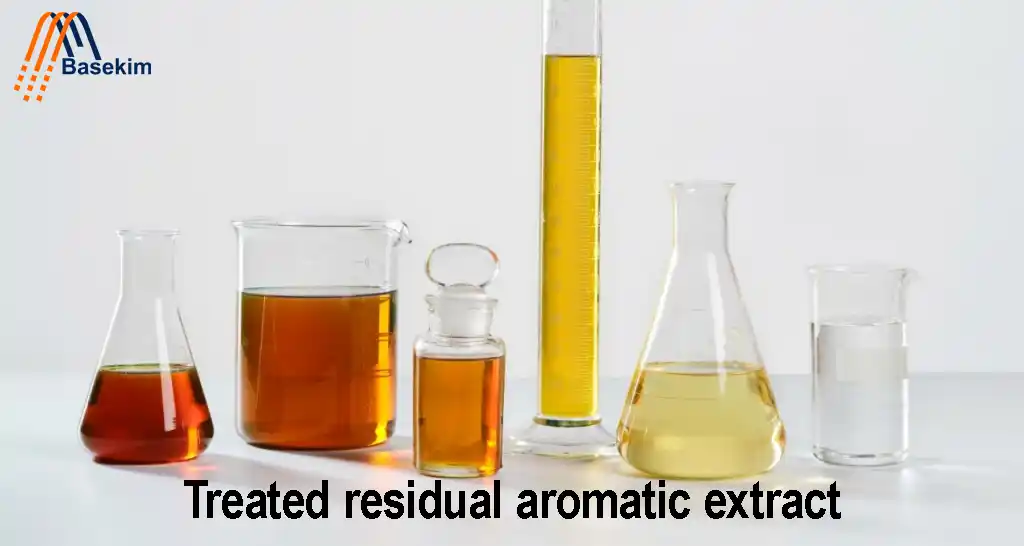- About Us
- Contact Us
- English

Treated Residual Aromatic Extract (TRAE) Supplier | Basekim UAE & Turkey

In industries where performance, safety, and compliance are non-negotiable, treated residual aromatic extract (TRAE) has become an essential choice. Known by its abbreviation TRAE, this process oil is widely used as a safer alternative to traditional extracts with higher polycyclic aromatic hydrocarbons (PAHs). Because global regulations have become stricter, companies are turning to TRAE to meet quality and environmental standards.
That is why Basekim, with a strong supply base in both the UAE and Turkey, is trusted by global industries to provide premium-quality treated residual aromatic extract at competitive prices.
What Is Treated Residual Aromatic Extract (TRAE)?
Treated residual aromatic extract (TRAE) is produced during the refining of petroleum oils. Unlike untreated extracts, it undergoes a treatment process that reduces harmful PAH content. As a result, TRAE delivers the solvency and performance industries need while aligning with safety and environmental regulations.
In fact, TRAE has replaced traditional distillate aromatic extracts in many countries due to European Union REACH compliance requirements. Therefore, it is now the preferred solution for industries seeking both performance and sustainability.
Why Choose Treated Residual Aromatic Extract (TRAE)?
Industries choose TRAE because it offers clear advantages:
-
Compliance with regulations: It meets strict EU REACH guidelines by reducing PAHs.
-
Enhanced safety: Because harmful compounds are minimized, TRAE is safer for workers and end-users.
-
Excellent solvency: It blends smoothly with rubber compounds and polymers.
-
Performance stability: TRAE provides the flexibility and durability industries demand.
-
Sustainability: In addition, it helps companies meet environmental goals without sacrificing performance.
Consequently, TRAE is considered the modern standard for rubber process oils in industries that want to avoid risks associated with low-grade alternatives.
Applications of Treated Residual Aromatic Extract
The versatility of treated residual aromatic extract (TRAE) makes it indispensable across multiple industries:
-
Tire Manufacturing
TRAE is widely used in passenger car tires and truck tires because it provides flexibility, grip, and wear resistance. Moreover, it complies with global safety requirements, ensuring manufacturers meet legal obligations. -
Rubber Compounds
It improves elasticity and durability in industrial rubber products such as hoses, seals, belts, and gaskets. Therefore, industries achieve stronger and longer-lasting performance. -
Polymer Blends
TRAE blends effectively with plastics and synthetic rubbers. As a result, it ensures smooth processing and reliable finished products. -
Industrial Applications
Because of its treated formulation, TRAE is used where both safety and performance are critical, including insulation and construction materials.
In short, treated residual aromatic extract is the backbone of many industries where reliability and compliance are priorities.
Basekim: Trusted Supplier in UAE and Turkey
Sourcing TRAE from unreliable suppliers can lead to non-compliance, poor quality, and supply chain risks. However, with Basekim, businesses secure a partner who guarantees consistency.
Here’s why Basekim leads in supplying treated residual aromatic extract:
-
Strategic hubs: With operations in UAE and Turkey, Basekim ensures fast shipping worldwide.
-
Strict quality control: Every batch of TRAE is tested to confirm low PAH content and performance standards.
-
Customer-focused approach: Because industries differ, Basekim tailors supply solutions to meet specific needs.
-
Proven reliability: Consequently, companies across Europe, Asia, Africa, and the Middle East trust Basekim for ongoing supply.
Above all, Basekim provides peace of mind that every shipment of TRAE meets international standards.
Why this product Is Better than Low-Grade Oils
Low-grade aromatic extracts often contain higher PAH content. As a result, they pose safety risks, environmental concerns, and compliance issues. In contrast, treated residual aromatic extract (TRAE) ensures:
-
Safer working conditions
-
Reduced regulatory risks
-
Long-term performance consistency
-
Stronger global acceptance
Therefore, TRAE is not only the safer choice but also the smarter investment. Moreover, suppliers like Basekim make it accessible at competitive rates without compromising on quality.
How to Order TRAE from Basekim
Securing a supply of treated residual aromatic extract is simple with Basekim:
-
Contact their sales team with your requirements.
-
Request a sample for testing and evaluation.
-
Place an order with flexible delivery from UAE or Turkey.
-
Receive ongoing support to ensure smooth operations.
Because Basekim makes the process easy and transparent, businesses can focus on production while relying on a steady TRAE supply.
Final Thoughts
To sum up, treated residual aromatic extract (TRAE) is more than just a replacement for older extracts. It is a safe, compliant, and high-performing solution for industries worldwide.
By partnering with Basekim, businesses gain access to premium TRAE, reliable logistics, and expert customer service. Therefore, for companies that want to avoid low-grade risks and meet modern standards, Basekim is the supplier of choice.
1. What industries benefit most from TRAE?
Tire manufacturing, rubber processing, and polymer industries benefit most, as TRAE improves performance while ensuring compliance.
Q2: What melt point should I choose for hot or cold climates?
Because TRAE undergoes treatment to reduce PAHs, it is safer for workers, consumers, and the environment.
Share On
Contact Info
Turkey office:No.6 of Fahrettin Pasa Sokak , Galip Erdem steet, Ilkbahar Mah. Turan Gunes Ave. Çankaya Ankara
Phone:00903125147055
Dubai office: 3509 of the Burligton tower, business bay, Dubai-UAE
Phone:0097142369830